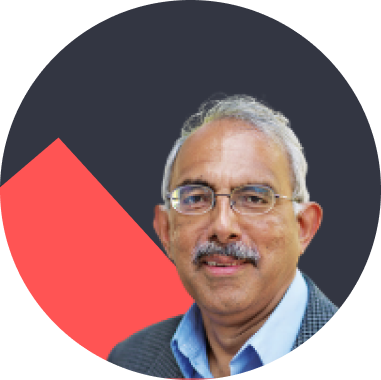Celebrating Failure with
Dr. Venkat Narayan

A Conversation with Dr. Venkat Narayan
“Celebrate failure. Nine out of 10 times, you’re going to fail. If you don’t fail, then you’ve not tried. Celebrate your failures as much as you celebrate your successes.”
Bio
K.M. Venkat Narayan, MD, is the Ruth and OC Huber Chair of Global Health and Epidemiology at the Rollins School of Public Health, the Director of Emory Global Diabetes Research Center, and a professor of medicine at the Emory University School of Medicine. He is the former chief of the diabetes, epidemiology, and statistics branch at the US Center for Disease Control and Prevention. With over 500 publications, Dr. Narayan is noted for substantial multidisciplinary work in diabetes and noncommunicable diseases. He is the recipient of numerous awards including the American Diabetes Association’s Kelly West Award, the Danish Diabetes Academy Visiting Professor Award, and Emory University’s Mentor of the Year Award.
What were some major events that helped shape your success?
“I believe that some parts of my childhood probably influenced me in a big way,” Dr. Narayan recalled. “I was born to my mother after her husband had died, so she was still pregnant with me. I grew up very much in a female oriented, female dominated family with multiple relationships. So that allowed me to understand the influence of plurality and how to navigate plurality in life rather than having very specific relationships.”
“We were an Orthodox Brahmin family and there were a lot of traditions at home. In India, when you’re 18-year-old, you don’t know exactly what you’re doing what for, and the options in those days was either get into medical school or get into engineering school. And luckily for me, I got to do both types of schools.”
“Although I never knew why I was doing it, I did it because everybody was doing it. I found medical education very routine, very boring, much on memorizing, whereas I was much more interested in probing questions, debating, reading, outside learning, and liberal arts. So I spent most of my medical school years reading a lot more English literature, philosophy, religion and things like that. Later I went on to become a clinical doctor. And then I was doing my medical residency training in England but a part of me still wanted to move away from medicine and become a lawyer.”
“When I look back, I think I was doing things never knowing what I was doing, but in the end they all fitted together.”
Should physicians have a diversified outlook, or should they focus on specialization?
“I think that’s going to depend a lot on the personality of the person and it’s going to depend a lot on what that person wishes to do or in which field. But in general, what I have found appealing is the broader outlook. I believe that regardless of the area of research you’re specializing, it’s important to read more widely outside of your disciplines and to interact with people outside of your disciplines.”
“When you think about the progress of science, a lot of ideas come from areas that are not within your specialties. There’s a lot of borrowing of ideas and a tremendous amount of creativity exists in areas and zones where boundaries cross each other.”
“It’s also a very creative way of thinking of new ideas. A lot of creativity is taking an idea from another field and trying to integrate your thinking into it or your field into it. I think that’s how a lot of discoveries tend to happen. I believe reading widely, mixing with people outside of your discipline, thinking of disciplines or methods that are used in other areas are extremely important. On the other hand, there is a role for remaining specific also, because you need both breadth and depth in certain areas.”
What are some of the traits and habits of the most successful mentees?
“I think mentees who tend to be open. Open to ideas and also people who have both the humility to want to learn, but also the confidence in themselves. So they have both humility and confidence and they are willing to very clearly have an idea of what they want to be themselves or what they would like to be.”
“An element of organization is important. You can get inspired, but ultimately to translate that inspiration into some sort of product or activity, you also need some level of organization. A lot of mentees struggle to figure out how to maintain productivity when life is busy. And there is a simple rule that I try to give them. I say it’s called a one to two-hour workday. Basically, you have to dedicate one or two hours of your day on the most important work that you are trying to do. You want to start the morning focusing on the most important and difficult thing that you’re doing. And do a little of it, put it away, and come back to it the next day.”
“Second, attack things that don’t take a lot of time, but can have a lot of results. Third, when you’re really bored and tired, work on things that don’t take a lot of time, but which may not be very useful in terms of results. If there are things that take a lot of time and don’t have results, don’t do that. You’ve got to learn to say no.”
What are the critical traits of the most successful students?
“Firstly, the ability to think on their feet. Secondly, to be able to address questions across the spectrum, not just in a specific area.” Along these lines, Dr. Narayan believes successful students have a determination. They take intellectual risks and speak about topics that they might not fully understand. They have energy and a broader interest in life. They have resilience and know how to rebound from failure.
“Nine out of ten times, you’re going to fail. If you don’t fail, then you’ve not tried. And so you also need to celebrate your failures as much as you celebrate your successes. You can’t afford to lose confidence. If you get a rejection, share it with people. Say, ‘I got rejected, but I’m going to try again.’”
What would be the one thing you would tell students in medical school to never forget?
“Your life is going to turn out, not the way you wanted to, but in completely different ways. And therefore be open. Face each challenge in a different way. You might run into new opportunities that you never realize. You might think you’re studying rheumatoid arthritis, but you might end up studying diabetes. Number one, I think that’s the most important thing.”
“And secondly, once you’re trained as a scientist, your abilities and your skills can be applied in lots of different ways, to solve lots of different problems. So you don’t have to restrict yourself.”
Pearls of Wisdom
- Remember that breadth is just as important as depth. Develop an intellectual curiosity and have the mindset of thinking broadly. Many of the advances in medicine have come from observations outside of medicine.
- Devote 1-2 hours on the most critical work of your day. Spend your most alert hours on those projects that are most significant in your life.
- Celebrate failure. Remember that if you have not failed, you have not tried. Rather than being sad about failures, celebrate them and move forward.
